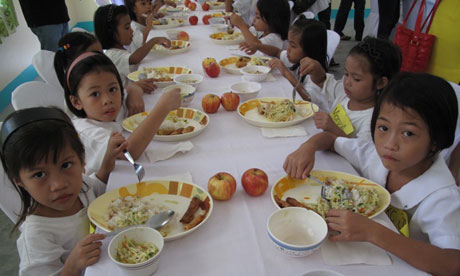 |
| Pupils at a newly built school sponsored by the Jollibee Foundation benefit from a feeding programme for undernourished children. Photograph: Sunshine Lichuaco de Leon |
The Philippines has 90 million people living on more than 7,100 islands, and 40% of them live on less than $2 per day. Achieving the millennium development goal to get all children into primary school (MDG2) for a population so spread out and with so few resources isn't easy, but the government is taking solid steps in that direction.Distance learning, free school meals and child-centred learning techniques in the Philippines are pushing the country closer to the goal of universal primary education.
According to Jess Mateo, assistant secretary at the department of education: "We remain confident because of the programmes and interventions we have put in place."
Figures for 2010 show the total number of children enrolled in primary school at 14.1 million, or 90% of all children aged between six and 11. Those not enrolled live largely in places considered "hard to reach" – remote, conflict-ridden, populated by indigenous people or prone to natural disaster.
Unicef's Philippines education specialist, Lulay de Vera, points out that the 2% population growth rate and climate change have exacerbated the problem. "There is no effective population management, especially among the poor," she says. "We are one of the most disaster-prone countries in the world. The intensification and frequency of these [disasters] have caused displacement and made it even more difficult for affected children to go back to school."
The government and Unicef are aiming to give more of these children access to education and to prevent them from dropping out in an attempt to reach MDG2 by the 2015 deadline. Distance learning is one idea, and incorporating a social care element into lessons in schools in conflict areas is another.
There is also a push to change the way in which children are taught. Recognising that many drop out because they lack interest, programmes are being implemented that make lessons more child-centred. Mateo says: "The conventional teaching [method] would be knowledge spoon feeding or delivering a lecture without any interaction. This programme modifies the teacher's role to facilitate learning."
There are also plans to make preschool attendance mandatory, which Unicef believes will help reduce the drop-out rate in primary schools. "Almost half the dropouts [take place] between the first and second grades, and we attribute this to a lack of school readiness," says De Vera, "Some pupils' first experience of school is at age seven or eight."
Convincing parents to send their children to school is one thing, but keeping the children in school long enough to graduate is another. Of those enrolled, about 6% were unable to complete the 2010 school year. The reasons for dropping out vary, but the root cause is the same – poverty. A lack of motivation on the part of parents also plays a big role. Mateo says: "Education is not a priority for many of them so if there is an opportunity to earn money, they lose interest in studying."
Zenaida Quiambao, headteacher at Pulungbulu primary school in Angeles City, explains: "Families migrate in search of better opportunities, while others can't attend to the basic needs of their children in school so older children are left at home to take care of younger ones while parents work."
The government has introduced a conditional cash transfer (CCT) programme to try to tackle the problem. Subsidies are given to the most needy families on the condition their children attend school and regularly go to health centres.
Healthy diets
Ensuring that pupils are physically and mentally ready to learn is another matter. Around 15% of primary school pupils in the Philippines are considered undernourished.
According to Maria Estrella Fajardo, school superintendent for the east district of Angeles City, there is a direct correlation between bad diets and poor performance in school. "Many are being fed lots of rice and soy sauce – this is dinner or breakfast. Others eat just instant noodles, or are skipping meals," she says. "Children who don't eat breakfast can't think as well. Their participation in classroom activities is also poor and they have a hard time comprehending the lessons."
Schools are being encouraged to come up with their own funding sources to address the problem. Pulungbulu school identifies children who are underweight and provides them with a nutritious free lunch for six months. Some 47 of the school's 800 pupils are on the programme.
Increasing the number of schools and classrooms in the country is another challenge the government faces. According to Mateo, decades of underinvestment in education combined with a fast-growing population has left the country in need of almost 67,000 classrooms. There is also a lack of high schools. The Philippines has 45,964 primary schools and only 12,950 high schools.
A public-private partnership programme has enabled 9,000 classrooms to be built since 2010, and there are plans to build 45,000 next year.
Efforts towards achieving MDG2 have brought about a vital change in the way the country is addressing the challenge. In the past, different agencies didn't work together to find comprehensive solutions. More effort is now being made, says Mateo. "The different departments ... education, social welfare and development, health, labour and agriculture are working together to study the problem from a more holistic point of view."
2 comments:
I am glad that major problems in the philippines and their solutions are for grabs.
Investigating the Elo Pillow: Does it really improve children's sleep, or is it just a fun toy? Now that we've got your attention, let's explore this fascinating subject and speculate on how Relax CBD can support children's sleep aids. Your thoughtful comments help to make the conversation well-rounded. Congratulations on starting this important discussion.
"#EloPillowDebate #CBDandSleep"
Post a Comment